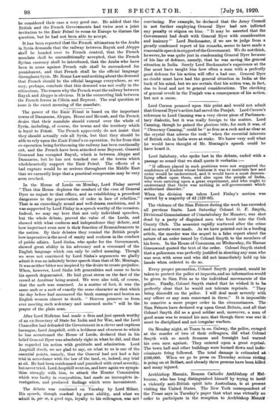The debate was continued on Tuesday by Lord Milner, His
speech, though marked by great ability, and what we admit is, per se, a good sign, loyalty to his colleagues, was not convincing. For example, he declared that the Army Council in not further employing General Dyer had not inflicted any penalty or stigma on him. "It may be asserted that the Government had dealt with General Dyer with consideration and leniency" Lord Buckmaster, if we are to judge from a greatly condensed report of his remarks, seems to have made a reasonable speech in support of the Government. We do not think, however, he was quite just in condemning General Dyer because of his line of defence, namely, that he was saving, the general situation in India. Surely Lord Buckmaster's experience at the Bar must have taught him how often a man with a perfectly " good defence for his action will offer a bad one. General Dyer no doubt must have had the general situation in India at the back of his mind, but we are certain that his action was, in fact, due to local and not to general considerations: The checking. of general revolt in the Punjab was a consequence of his action, but not a cause.


































 Previous page
Previous page